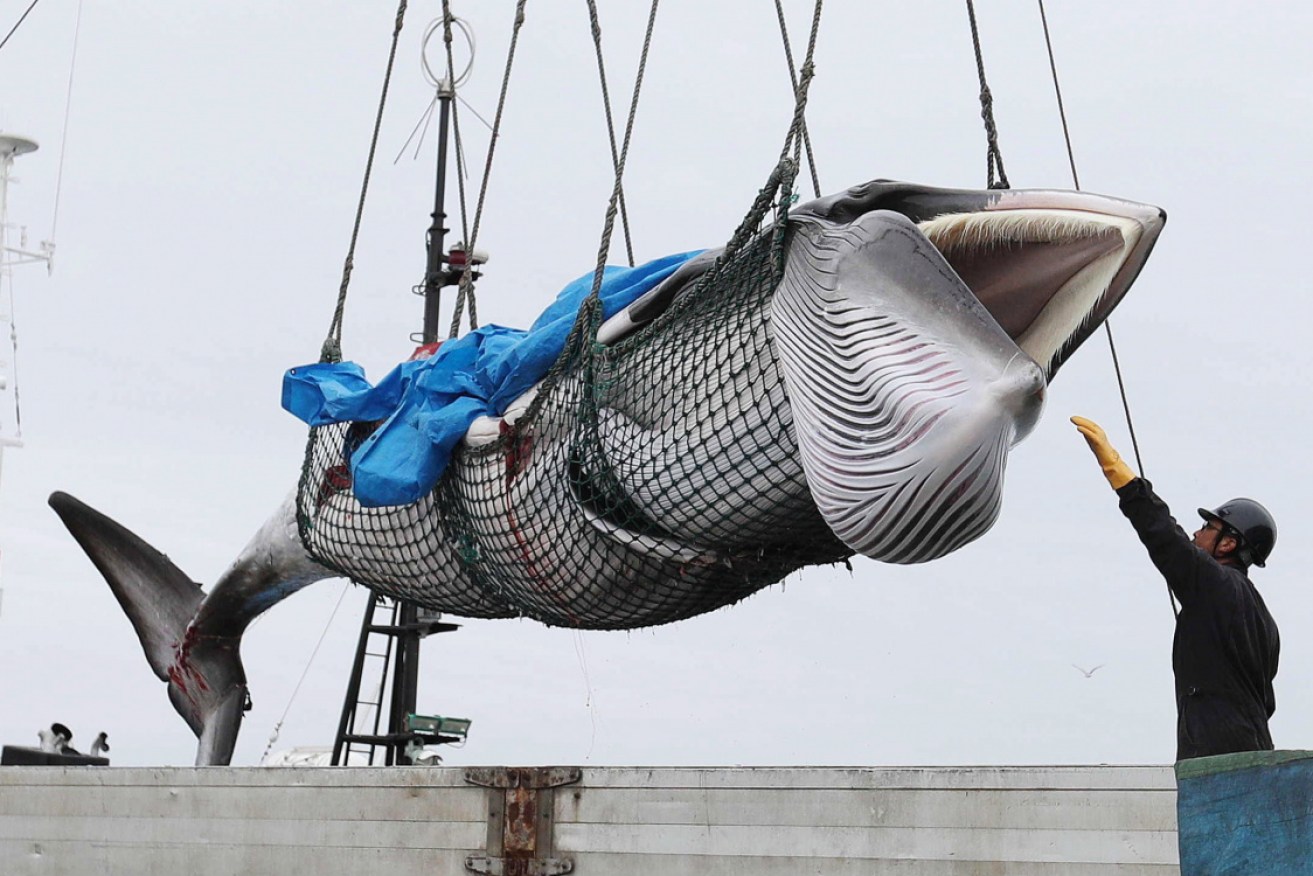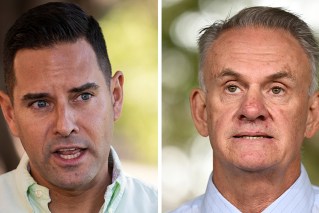Part of their culture or vicious practice? Why the Japanese hunt whales


Japanese whalers have brought home their first official commercial catch in 31 years. Photo: AAP
A man who spent nine nights detained on a Japanese whaling vessel has called on the Australian government to pressure Japan to end its commercial whaling.
At the height of the whale wars in 2012, Australian activist Glen Pendlebury clambered aboard Shonan Maru No.2 with Geoffrey Tuxworth and Simon Peterffy, as it passed the Western Australian coast en route to Antarctica.
The trio hoped the ship would return them to Australia, thus stalling the whaling process, but the captain refused and they found themselves on the other side of the fight for 10 days.

Glen Pendlebury, Geoffrey Tuxworth and Simon Peterffy. Photo: Sea Shepherd
It caused a diplomatic stoush, with then prime minister Julia Gillard slamming the protests as “unacceptable”.
Now Japanese whalers have brought home their first commercial catch in 31 years.
As the two minke whales were loaded onto a truck, workers in blue plastic overalls poured sake over them to express their thanks.
Japanese fisheries agency officials said the whale meat would be auctioned at a fish market on Thursday.
“We hope commercial whaling will be on track as soon as possible, contribute to local prosperity and carry on Japan’s rich whale culture,” deputy chief cabinet secretary Yasutoshi Nishimura said.
Foreign Affairs Minister Marise Payne and Environment Minister Sussan Ley condemned the move on Tuesday.

Activists approaching Japanese whaling ship Shonan Maru 2. Photo: Sea Shepherd
“While the Australian government welcomes the end of whaling in the Southern Ocean, we are disappointed that Japan has withdrawn from the convention and is resuming commercial whaling,” the pair said.
But Mr Pendlebury said the Australian government should be putting pressure on the Japanese to immediately stop whaling.
“It’s close to our oceans. We’re involved whether we want to be or not,” he told The New Daily.
“It doesn’t make a difference if we kill them here or there. When there’s a species that is migratory, it doesn’t matter where you kill them.
“We make a lot of money out of ecotourism around whales. So I think the government should stand up. It’s in our country’s best interest.”
During his time on the boat, Mr Pendlebury said he built rapport with many of the fishermen, who confided they didn’t want to be there.
“These people going out, they don’t want to be doing it,” he said.
“It’s not high class, they’re not looked after. The captain of the Shonan Maru cried. He shed a tear over what he was doing.”

Families of the crew celebrate their return on Tuesday. Photo: AAP
Japanese tastes for whale meat peaked in 1962 when 226,000 tonnes were produced, but that number has dwindled to just 0.1 per cent of the meat consumed within the country in 2017.
Those that do eat it are often part of the older generation, who enjoy it for nostalgic reasons.
The fact there’s no demand and the high costs of catching the creature means the industry is heavily subsidised by the government.
“The total subsidies budget for the whaling industry is 5.1 billion yen ($67.5 million) just this year,” researcher Junko Sakuma said.
“Regarding the restarting of commercial whaling, the industry got paid 2.8 billion yen in total just for conducting research.”

Last year alone, Japan killed 333 minke whales in the Southern Ocean. Photo: Getty
It is not confirmed how long the subsidy will run for, but within Japan people weren’t widely aware of it, she said.
“The public doesn’t know much about this subsidy. In a few years, we will see how much whale meat people really need.”
Japan Greenpeace spokesperson Akiko Tsuchiya said the low demand showed the industry was on its last legs.
“It is difficult to think that the industry will grow rapidly if the government has to support the declining industry by using taxpayers money,” she said.
“We want to know why the government cares about one specific industry which is difficult to sustain without subsidies.”
The Japanese government should be more concerned with protecting their oceans rather than a dying industry, Ms Tsuchiya argued.

Whale meat was an affordable protein after World War II. Photo: Getty
“Now is a critical time for ocean protection. A time when threats to our global oceans are increasing, with direct impacts on species like whales,” she said.
Pride and politics
A combination of pride and politics is propping up the dying industry.
Opinion polls show broad support for whaling, even if people aren’t willing to eat it, said dolphin and whale action network activist Nanami Kurasawa.
“It’s a kind of nationalism,” she said. “The government succeeded in telling people that whale is an important marine resource and part of our traditional culture. People just believe it, because they don’t have much interest in it.

It is mainly served in seaside towns and regional areas. Photo: Getty
“Many Japanese don’t care about whales or whaling, but they’re tired of fighting about the issue.”
For other people, it’s about not being told what to do by another country.
“For many years the international community condemned Japan, so many Japanese people build a high wall to foreign voices,” she said.
“People say ‘I don’t eat whale meat but I don’t want to be told from outsiders what I can eat or not’.”








